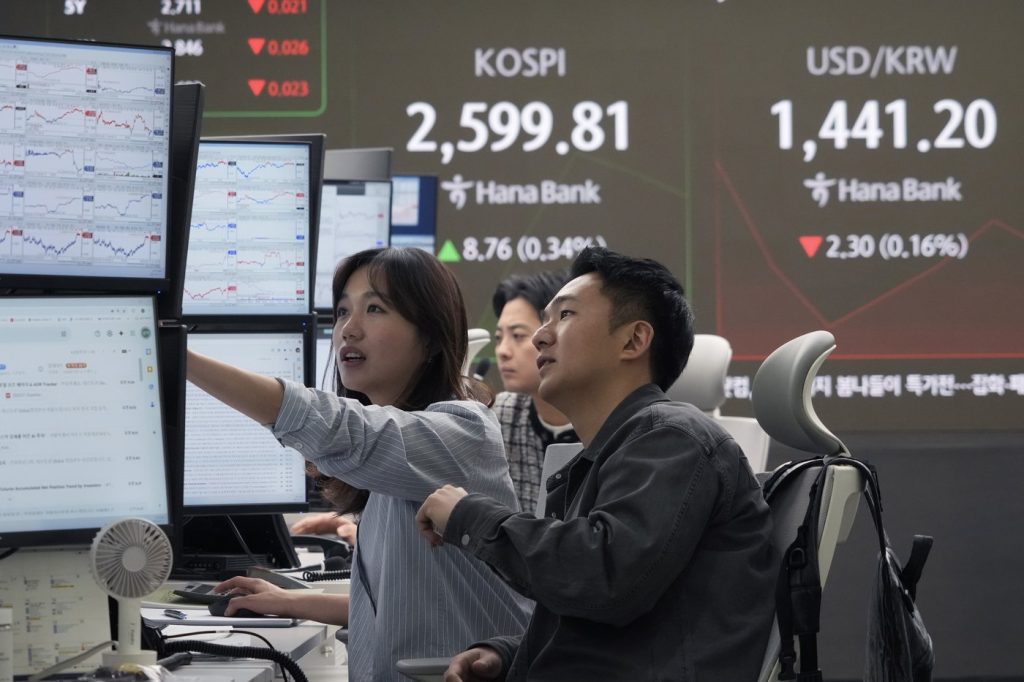TOKYO (AP) — On Monday, Asian markets predominantly traded higher, influenced by economic data and policy maneuvers from President Donald Trump. Such developments are anticipated to affect global central banks' decisions in the near future.
Japan's Nikkei 225 index saw a rise in early trading following a report from the Cabinet Office indicating that the economy grew at a robust annual rate of 2.8% in the fourth quarter of 2024. This growth was supported by stable exports alongside moderate consumer spending. Despite the initial uptrend, the benchmark quickly experienced a pullback before stabilizing, ultimately showing a minimal gain of less than 0.1% at 39,164.87 during morning trading.
On a quarter-to-quarter basis, Japan, the world’s fourth-largest economy, reported a growth of 0.7%, marking its third consecutive quarter of expansion. The country concluded its fourth year of continuous growth in the previous year, achieving a modest 0.1% increase in seasonally adjusted real gross domestic product (GDP), which gauges the overall value of goods and services produced.
In the wider Asian market landscape, Australia’s S&P/ASX 200 slid 0.6% to settle at 8,503.70. Conversely, South Korea's Kospi index surged by 0.8% to reach 2,610.91. In Hong Kong, the Hang Seng index experienced a rise of 0.6%, closing at 22,752.20, while the Shanghai Composite index reported a 0.2% gain, finishing at 3,352.01.
Last week, Wall Street concluded on a cautious note, retreating slightly from its all-time high following mixed earnings reports from major companies like Airbnb and Wynn Resorts. The S&P 500 index reported a minimal decline of less than 0.1% after briefly rallying to just shy of its record set the previous month. The Dow Jones Industrial Average dropped by 165 points, or 0.4%, while the Nasdaq composite gained 0.4% during the same session.
For the week, the S&P 500 closed slightly lower at 6,114.63, while the Dow Jones finished at 44,546.08, a decrease of 165.35 points. The Nasdaq climbed 81.13 points to close at 20,026.77. Despite this dip, the S&P 500 achieved its first weekly gain in three weeks, bolstered by stronger-than-expected profits from companies at the close of 2024. This helped lift market sentiment despite ongoing concerns regarding rising interest rates and persistent inflation.
The week witnessed disappointing reports suggesting an unexpected acceleration in inflation, affecting consumer budgets, and indicating that the Federal Reserve may remain cautious regarding interest rate cuts. Analysts suggest that persistent high inflation could hinder the Fed's ability to lower rates, which typically aim to keep inflation around 2%. Low rates can inadvertently fuel further inflation, raising additional concerns for economic stability.
Tariffs announced by Trump could exert further upward pressure on inflation. Nevertheless, market observers speculate that a significant global trade war may be avoided, as recent tariff announcements are set to take time before full implementation, allowing space for negotiations between Washington and other nations.
In the bond market, the yield on the 10-year Treasury note dropped to 4.47% by Friday, down from 4.54% the previous day. This yield has seen considerable fluctuations since the Federal Reserve's initiation of interest rate cuts.
In energy trading, benchmark U.S. crude oil fell by 17 cents to $70.57 per barrel, while Brent crude declined by 13 cents to $74.61 per barrel. Currency trading observed a decline in the U.S. dollar to 151.60 Japanese yen, down from 152.25 yen previously. The euro, on the other hand, rose to $1.0594 from $1.0495.










